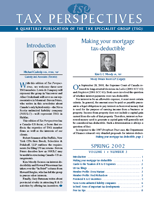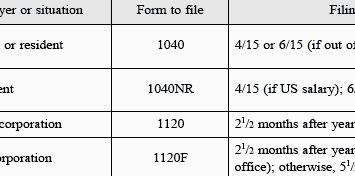
PDF Format
 Issue Contents Issue Contents
 All Issues All Issues
Spring 2002
Volume 1, Number 3
The information in Tax Perspectives is prepared for general interest only. Every effort has been made to ensure that the contents are accurate. However, professional advice should always be obtained before acting on the information herein.
US Tax Filings
By Robert Sommer, CPA
Brock, Schechter & Polakoff, LLP (Buffalo, New York)
For a variety of reasons, many Canadians have a keen interest in US tax matters. But keeping track of US tax filing requirements is not an easy matter. This article briefly summarizes the more commonly encountered tax filings, when and why they are required, and their due dates. US CITIZENS AND US RESIDENT ALIENS US citizens and US resident aliens must file US income tax returns reporting their worldwide income, regardless of where in the world they actually live. US citizens must comply with this requirement, regardless of whether they hold other citizenships (such as Canadian) and regardless of whether they hold a current US passport. In addition, children of US citizens are automatically US citizens as well, extending the filing requirement to the next generation. For those US citizens living outside the United States who have not complied with the requirement to file tax returns, the IRS has a voluntary disclosure program, and typically seeks six years of tax returns. A person may be classified as a US resident upon meeting one of two tests: the lawful permanent resident test (otherwise known as the "green card" test) or the substantial presence test. The green card test is straightforward. A person holding a US green card is considered a US resident. The second test—the substantial presence test—requires more explanation. An individual will be considered a US resident if he or she spends 183 days or more in the United States in the year. In addition, if the person cannot show a closer connection to another country, then a three-year moving average test can apply. Under this test, days in the current year count as a day, days in the preceding year count as one-third of a day, and days in the second preceding year count as onesixth of a day. If the person accumulates a total of 183 days under this test, and has 31 days present in the United States in the current year, he or she will be considered a US resident. If, however, by filing Form 8840, one can demonstrate a closer connection to another country, the three-year moving average test will not apply. All US domestic corporations are required to file US tax returns, reporting their worldwide income. Further, US limited liability companies that elect to be treated as US corporations are also required to file on this basis. NON-US PERSONS Non-US persons are required to file US tax returns in certain circumstances where they have US-source income. In general, there is no requirement to file a US tax return for passive income, as long as the correct amount of withholding tax has been deducted. However, if the amount of withholding tax deducted is incorrect, it is adjusted by filing a US non-resident tax return (Form 1120F for a corporation or Form 1040NR for an individual). An individual who derives employment income, business income, or gains from the disposal of US real estate must report this income on an individual income tax return (Form 1040NR). A corporation with income effectively connected to a US trade or business, including gains from the sale of US real estate, must report this income on a corporate tax return (Form 1120F). Where an individual, trust, or corporation derives rental income from US sources, 30% withholding tax will be taken from the gross rental income. Alternatively, these persons may elect to file a tax return reporting the net rental income and pay tax on it at graduated tax rates. Canadian individuals who are required to file a 1040NR return will need a taxpayer identification number. This takes some time to obtain, and is not a straightforward procedure. Form W-7 is used for this purpose. Persons who take the position that an international tax treaty (such as the Canada—US treaty) exempts them from US taxation may need to file a treaty-based return position disclosure using Form 8833. There are substantial penalties for not filing this return. Canadians who own 25% or more of a US corporation and foreign corporations engaged in a trade or business in the United States may be required to file Form 5472. This article is certainly not a comprehensive list of all US tax filing requirements, but it does outline those more commonly encountered. 
Illustration #1By paying close attention to the filing requirements, the due dates, and required payment schedules, you will greatly reduce your exposure to interest and penalties, and thus have a happier experience when pursuing US activities. TAX FILING DATE SUMMARY Click on Illustration #1.
|